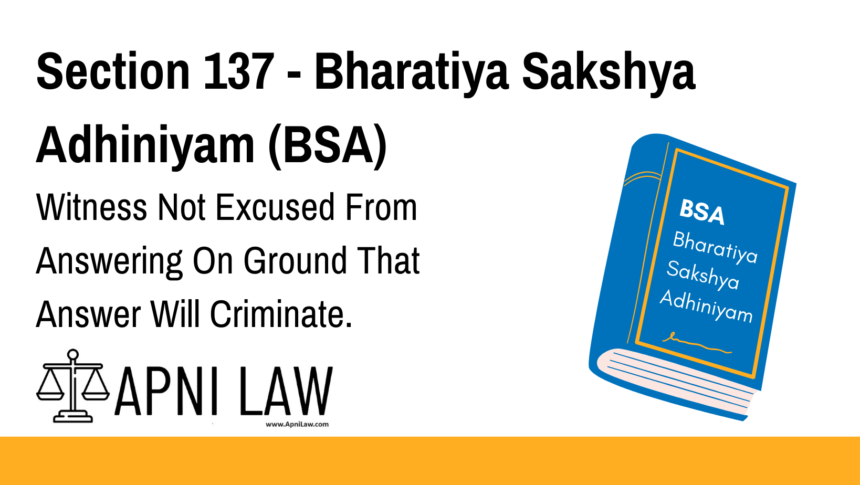Code: Section 137 BSA
A witness shall not be excused from answering any question as to any matter
relevant to the matter in issue in any suit or in any civil or criminal proceeding, upon the
ground that the answer to such question will criminate, or may tend directly or indirectly to
criminate, such witness, or that it will expose, or tend directly or indirectly to expose, such
witness to a penalty or forfeiture of any kind:
Provided that no such answer, which a witness shall be compelled to give, shall
subject him to any arrest or prosecution, or be proved against him in any criminal proceeding,
except a prosecution forgiving false evidence by such answer.
Explanation of Section 137 BSA
Section 137 of the Bharatiya Sakshya Adhiniyam (BSA), 2023, lays down a crucial principle related to witness testimony. It clarifies that a witness cannot refuse to answer questions in court merely because their answer might be self-incriminating or could lead to a penalty or forfeiture.
However, to protect the rights of the witness, the law includes a safeguard: if the witness is compelled to answer such a question, that answer cannot later be used against them in a criminal prosecution, except in cases of perjury (i.e., if they give false evidence).
This provision balances two essential aspects of justice:
- The court’s need for truthful and complete testimony.
- The witness’s protection from self-incrimination and unfair prosecution.
Key Highlights
- A witness cannot refuse to answer a relevant question simply because it may incriminate them.
- Protection is granted: such compelled answers cannot be used against the witness in future criminal proceedings.
- The only exception is when the witness lies under oath—then they can be prosecuted for perjury.
Illustration
Example 1: Self-Incriminating Testimony in a Theft Case
A person is called as a witness in a theft case. During cross-examination, they are asked if they helped conceal the stolen items. Even if the answer could implicate them, Section 137 requires them to answer. However, that answer cannot later be used to prosecute them—unless it turns out they lied under oath.
Example 2: Exposure to Penalty in Civil Proceedings
In a civil case concerning tax evasion, a witness is asked about undeclared income. They cannot refuse to answer on the grounds that the truth could lead to a tax penalty. But any compelled answer will not be used in a criminal prosecution unless they are found to have given false evidence.
Common Questions and Answers
Q1. Can a witness refuse to answer if the response could get them in legal trouble?
No. Under Section 137, a witness must answer even if the answer may incriminate them or lead to penalties or forfeiture.
Q2. What legal protection does the witness get in return?
The law protects such a witness by ensuring their compelled answers cannot be used to prosecute them in criminal court—except in a case of perjury.
Q3. Does this apply to both civil and criminal cases?
Yes. Section 137 applies to testimony in both civil and criminal proceedings.
Q4. Can a witness be prosecuted based on their own answer?
Only if they lie under oath. If a witness gives false evidence, they can be prosecuted for perjury. Otherwise, compelled truthful answers are protected from use in future criminal cases.
Q5. What is the purpose of this provision?
The goal is to ensure the administration of justice by compelling truthful testimony while safeguarding the witness’s constitutional and legal rights.
Conclusion
Section 137 of the Bharatiya Sakshya Adhiniyam ensures that witnesses must provide full and truthful testimony even if such answers may incriminate them. At the same time, it protects their rights by shielding them from prosecution based on those compelled answers—unless they commit perjury. This balances the integrity of judicial proceedings with the protection of individual freedoms.
For more in-depth legal content and explanations of Indian laws, visit ApniLaw.








